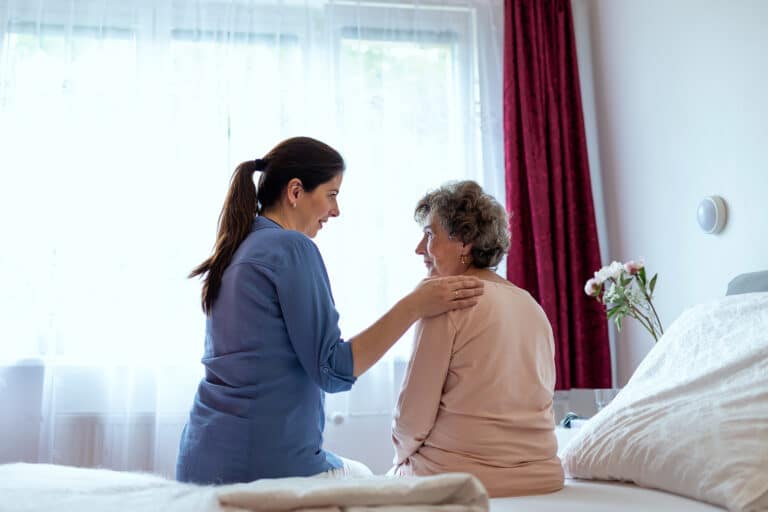Each April, Parkinson’s Disease Awareness Month highlights the impact of this progressive neurological disorder and the importance of early detection. Parkinson’s disease affects movement, balance, and coordination, making daily activities increasingly difficult over time. According to the Parkinson’s Foundation, nearly 1 million people in the United States are living with Parkinson’s, and approximately 90,000 new cases are diagnosed each year. Despite these numbers, many seniors may not recognize the early signs of the disease or may hesitate to seek medical attention.
For seniors experiencing symptoms, in-home care provides valuable support by helping with daily tasks, monitoring health changes, and encouraging doctor visits for early diagnosis. Assisting Hands Loudoun offers compassionate care that allows seniors to remain safe and independent at home, even as they adjust to life with Parkinson’s.
What Is Parkinson’s Disease Awareness Month?
Parkinson’s Disease Awareness Month serves as a reminder to educate the public about this condition, support those affected, and promote research toward better treatments. The disease results from the gradual loss of dopamine-producing nerve cells in the brain, leading to tremors, muscle stiffness, and slowed movements.
While Parkinson’s is more common in older adults, early symptoms can appear years before an official diagnosis. Raising awareness helps families recognize when a loved one may be struggling and ensures they receive the care they need as early as possible.
5 Signs a Senior Could Be Suffering in Silence from Parkinson’s
1. Subtle Changes in Handwriting
A condition called micrographia causes handwriting to become smaller and more cramped over time. If a senior’s writing has changed significantly without explanation, it may be an early sign of Parkinson’s.
How In-Home Care Helps: Caregivers can assist with communication tools, ensuring seniors can still write, type, or use voice-to-text technology.
2. Frequent Balance Issues or Unsteady Walking
Parkinson’s affects coordination and muscle control, leading to an increased risk of falls. Seniors may experience difficulty starting to walk, hesitate when turning, or feel like their feet are stuck to the floor.
How In-Home Care Helps: Caregivers provide mobility support, assist with physical therapy exercises, and make the home environment safer by removing tripping hazards.
3. Masked Facial Expressions
A senior with Parkinson’s may appear to have a blank or emotionless facial expression, even when they feel engaged in a conversation. This happens because Parkinson’s affects muscle control, including those responsible for facial movements.
How In-Home Care Helps: Caregivers offer social interaction and encouragement, helping seniors stay engaged and express themselves in other ways.
4. Soft or Slurred Speech
A senior with Parkinson’s may speak in a softer voice, trail off at the end of sentences, or have difficulty articulating words clearly. This can lead to frustration and withdrawal from social activities.
How In-Home Care Helps: Caregivers encourage communication, remind seniors to speak slowly, and assist with speech therapy exercises.
5. Sudden Sleep Problems or Restless Nights
Disruptions in sleep patterns, such as talking, kicking, or acting out dreams, can be early signs of Parkinson’s. Fatigue during the day may also indicate that something is affecting nighttime rest.
How In-Home Care Helps: Caregivers establish calming bedtime routines, assist with medications, and monitor changes in sleep patterns that may require a doctor’s attention.
How In-Home Care Supports Seniors with Parkinson’s
Once a senior is diagnosed with Parkinson’s, daily life becomes more challenging. Simple tasks like buttoning a shirt, preparing meals, or walking across a room may require assistance. In-home care provides the support seniors need to manage symptoms while maintaining independence.
Encouraging Medical Follow-Ups
Regular doctor visits are essential for managing Parkinson’s. Caregivers help seniors keep track of appointments, provide transportation, and ensure medical recommendations are followed.
Assisting with Daily Activities
Tasks like dressing, grooming, and eating can become difficult over time. In-home caregivers offer respectful assistance to help seniors maintain dignity and comfort.
Providing Medication Reminders
Parkinson’s medications need to be taken at specific times to manage symptoms effectively. Caregivers ensure that medications are taken as prescribed, reducing the risk of missed doses.
Supporting Physical Activity
Exercise is a key part of Parkinson’s management. Caregivers can encourage movement by assisting with walks, stretching exercises, and doctor-approved fitness routines.
Helping with Meal Preparation
Nutritional support is important for seniors with Parkinson’s, especially if they experience difficulty swallowing. Caregivers prepare meals that meet dietary needs and ensure seniors stay hydrated.
Assisting Hands Loudoun: Compassionate Care for Seniors with Parkinson’s
Early detection and proper care can greatly improve the quality of life for seniors with Parkinson’s. In-home care from Assisting Hands Loudoun provides the assistance needed to manage symptoms, prevent falls, and promote overall well-being. If your loved one is showing signs of Parkinson’s or needs support after a diagnosis, our caregivers are here to help.
Assisting Hands of Loudoun proudly serves Ashburn, Leesburg, Lansdowne, Aldie, Broadlands, Brambleton, Belmont, Sterling, Dulles, Hamilton, Purcellville, Loudoun County, and surrounding areas in Northern Virginia.
We provide Senior Home Care, In-Home Personal Care, Companion Care at Home, In-Home Dementia Care, Hospital-to-Home Transition, and 24-Hour Home Care. Call us today for a free, no-obligation assessment at (571) 605-1545.
- 4 Reasons Your Senior Should Stop Driving - May 28, 2025
- Celebrating and Honoring Seniors During Older Americans Month - May 9, 2025
- Supporting Independence: How Home Care Assistance Helps Seniors with Daily Living - April 25, 2025

